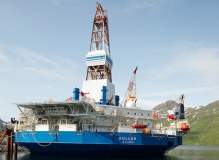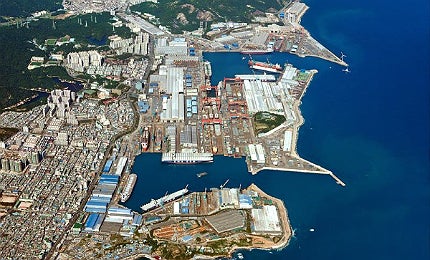
Transocean agree to pay $1.4bn for Gulf oil disaster
Switzerland-based offshore drilling company Transocean reached an agreement with the US Department of Justice in January to pay $1.4bn to settle all civil and criminal claims relating to the 2010 Deepwater Horizon accident in the Gulf of Mexico.
The Deepwater Horizon oil rig, which is owned and operated by Transocean but leased to BP, caught fire and sank in the Gulf of Mexico while drilling at BP’s Macondo well, leading to one of the largest offshore oil spills in US history.
How well do you really know your competitors?
Access the most comprehensive Company Profiles on the market, powered by GlobalData. Save hours of research. Gain competitive edge.

Thank you!
Your download email will arrive shortly
Not ready to buy yet? Download a free sample
We are confident about the unique quality of our Company Profiles. However, we want you to make the most beneficial decision for your business, so we offer a free sample that you can download by submitting the below form
By GlobalDataUnder the agreement, the company will pay a $100m fine for failing to adequately monitor the well at the time of the explosion in April 2010, which killed 11 workers.
Subsea gas compression tech to facilitate platform-free production
Offshore drilling expeditions in harsh subsea regions and technologically challenging places are set to become easier, with the development of new subsea gas compression technology that will facilitate production of oil in a platform-free environment.
Royal Dutch Shell last month deployed a prototype compressor at the Ormen Lange natural gas field in the Norwegian Sea, which is likely to make platform-free offshore production a reality within a decade.
The technology will be particularly beneficial in places such as the Arctic and Alaskan regions, where installation of rigs is an ecological and technological challenge. Norway’s Statoil has also committed to subsea compression at its Aasgard field by 2015.
ExxonMobil plans $14bn investment in Canada’s Hebron field
US-based multinational oil and gas company ExxonMobil announced in January it will proceed with its plan to develop the Hebron oil field in the province of Newfoundland and Labrador, offshore of Canada.
The company said it plans to spend nearly $14bn to construct the platform, which is expected to have a daily production capacity of 150,000 barrels of oil.
The field is located at a water depth of 300ft in the Jeanne d’Arc Basin, offshore of Newfoundland and Labrador, more than 350km south-east of the capital of St. John’s and 32km south-east of the company’s Hibernia project.
US launches review of Arctic drilling after Shell rig accident
The US Interior Department launched a high-level assessment of Royal Dutch Shell’s 2012 Arctic oil drilling programme in the Beaufort and Chukchi Seas, in an effort to review existing practices.
The government also intends to assess any challenges involved and examine previous lessons learned in regards to oil and gas activities in the region.
The announcement follows an accident that took place on 31 December 2012, wherein one of two drill ships deployed by Shell for offshore drilling ran aground in shallow water in the Gulf of Alaska, after drifting in stormy weather.
Leak at Cormorant Alpha platform shuts 27 UK oil fields
Abu Dhabi National Energy Company (TAQA) closed the Cormorant Alpha platform and 27 associated pipeline oil fields in the northern UK North Sea, after hydrocarbons were detected in one of the platform legs.
TAQA said at the time that it had contained the hydrocarbons within the platform leg and ensured that nothing leaked into the sea, while a technical team had started investigating the source of the leak.
As a precautionary measure, the company called-off all non-essential work on the platform, located 100 miles from north-east of Shetland. The platform remains shut.
UK rejects EU proposal to stop Arctic drilling
The UK Government last month dismissed the proposed European Union (EU) regulations on deep sea Arctic drilling, despite fresh concerns arising after the grounding of a Shell oil rig recently.
Leaked EU documents revealed that the government wanted to modify proposals that could prevent oil and gas drilling operations in the Arctic, reported the Guardian.
The UK has been keen to remove the clause, saying that "oil spills may be effectively dispersed by wind and wave action and this is in itself one form of effective response".
HHI to develop $1.1bn topside facility for Statoil platform
South Korea-based shipbuilder and offshore facilities contractor Hyundai Heavy Industries (HHI) last month received a $1.1bn order from Statoil to develop a topside facility for installation on the Aasta Hansteen spar hull in the Norwegian Sea.
As part of the contract HHI will develop the 21,000-tonne topside facility, which will have the capacity to produce 23 million cbm of oil and gas per day.
Upon its completion, which is likely to be in 2016, the facility will be installed at the Aasta Hansteen field, located 300km off the coast of Norway.
Tax relief in oil and gas reserves boosts investment, jobs in UK
Last month it was revealed the UK Government’s latest tax relief in oil and gas reserves had attracted billions of pounds worth of projects for British companies and created thousands of new, highly skilled jobs in the country, according to Secretary of State for Energy and Climate Change MP Edward Davey.
Addressing MPs at the British Offshore Oil & Gas Industry All Party Parliamentary Group annual reception at Westminster, Davey said the oil and gas industry is vital to meeting the nation’s power and economic requirements and will be fundamental for the country’s energy policy in the decades to come.
"A record breaking offshore licensing round and investment highs, the North Sea is experiencing a recent renaissance. We are working in partnership with the oil and gas industry to create a positive investment environment and a bright future for the North Sea, securing thousands of jobs across the UK," Davey said.













